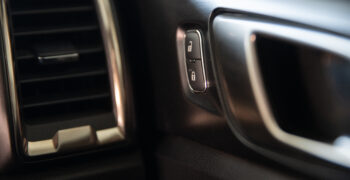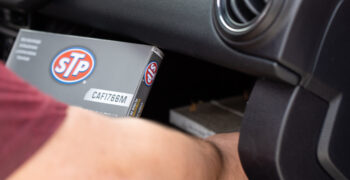SIGNS YOU NEED A NEW AIR FILTER
The engine needs approximately two and a half times its displacement in air to run efficiently every minute. At idle, a 2.0-liter gas engine needs around 25 cubic feet of clean air per minute, and that goes up commensurately when the RPMs do. To get that much clean air into the engine, the air filter needs to allow plenty of air to flow through it.
If it’s restricted by contaminants, you’ll begin to notice these symptoms of a dirty air filter.
1. DIRTY FILTER
When you inspect the air filter – which should be done at least every time the engine oil is changed – you might notice there’s debris stuck between the filter pleats or there’s dirt collecting on the material. Although some dirt and debris can be knocked loose or blown out with compressed air, the engine air filter should be replaced if you can’t see a light source through the pleated material.
2. WEIRD NOISES
An engine that’s starving for clean air will begin to make strange noises at times. It could be a sputtering sound, coughing, or popping from the engine area. The limited air supply flowing into the engine throws the air-fuel mixture out of whack and the engine runs inefficiently, which can cause the noises you hear. There isn’t enough air in the engine to thoroughly burn the fuel that’s been injected.
3. CHECK ENGINE LIGHT
There isn’t a sensor on the air filter itself to indicate that it’s dirty, but there are other monitors that can insinuate decreased air intake. The mass air flow sensor, for example, could read lower levels of air entering the intake than normal, signalling potential air filter issues. The oxygen sensors in the exhaust can also determine that the combustion process isn’t on par, which is often caused by a plugged air filter. When these parameters are outside the normal range, it can trigger a Check Engine Light to come on.
4. BLACK SMOKE FROM EXHAUST
Black smoke from the tailpipe indicates an air-fuel mixture that’s too rich; that is, the proportion of fuel to air is too high. When that happens, the fuel doesn’t burn thoroughly before the exhaust stroke pushes it out of the combustion chamber, and the exhaust appears black, laden with unburned fuel.
5. UNBURNED FUEL SMELL FROM EXHAUST
Similarly, a raw fuel smell from the exhaust is one of the common clogged air filter symptoms. If it’s badly blocked, the engine tries to compensate for a lack of performance by injecting more fuel to burn. When that happens and it doesn’t burn completely, it can exit the tailpipe and you’ll notice a fuel smell.
6. FUEL ECONOMY IS NOTICEABLY LOWER
As the fuel system compensates for restricted airflow, it dumps more gas into the engine to attempt to produce the power you need to drive. The amount of fuel burned is noticeably more than normal, and fueling up more often might be an indication you should check the air filter’s condition.
7. HESITATION OR STUMBLING ON ACCELERATION
Symptoms of a bad air filter can include decreased performance. If your car doesn’t accelerate smoothly, it bucks and burps when you’re cruising, or it stumbles and stalls when you’re decelerating, it can all point to a dirty air filter.
HOW TO CHANGE AN AIR FILTER
Most air filters take only a few minutes to remove and replace:
- Locate the air filter housing.
- Unclip or unscrew the housing to expose the air filter.
- Lift the old filter out. It might be a snug fit.
- Clean any dirt or debris from the housing to prevent the new filter from getting dirty prematurely.
- Slip the new air filter into place in the same orientation as the old one.
- Fasten the housing to finish up.
To find the right air filter for the job, shop at AutoZone. Whether you shop online or in-store, choose the engine air filter that fits your vehicle using your vehicle information.
FAQ/PEOPLE ALSO ASK





